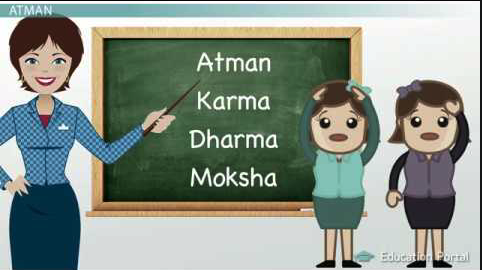Simple answers to your questions on Hinduism are provided here.
Use the search button (top right on desktop, top left on smartphones) to find specific topics of interest. At the bottom of each answer, check the “Tags” section for related topics. To learn more about this Q&A project, click [here].

On Hinduism
You can also download an earlier collection: 300QAs on Hinduism (PDF). Thank you.

02. God Forms
Yes. It happens when there is decay of dharma (see below) or righteousness in the world.
In Hinduism there is no finite end of the world – there is only the end of one phase followed by the beginning of the next. The world goes through many cycles of varying degrees of order, chaos, good vs. evil, and eventually all matter dissolves completely followed by a regeneration.
In Bhagwad Gita, Krishna advises Arjuna in chapter 4 verse 7:
“yadā yadā hi dharmasya glānir bhavati bhārata
abhyutthānam adharmasya tadātmānaṁ sṛijāmyaham”
“Whenever there is decay of dharma and rise of adharma, then I am born in this world”.
The current age is called Kali Yuga in Hinduism i.e. the age of darkness.
In the Hindu scripture the Bhagavatam the following is said in regard to Kali Yuga:
Srimad Bhagavatam 12.2.1:
“Sri-suka uvaca…tatas canu-dinam dharmah…satyam saucam ksama daya…kalena balina rajan…nanksyaty ayur balam smrtih”.
“Religion, truthfulness, cleanliness, tolerance, mercy, duration of life, physical strength and memory will all diminish day by day because of the powerful influence of the age of Kali..“
Srimad Bhagavatam 12.2.2:
“vittam eva kalau nṝṇāḿ…janmācāra-guṇodayaḥ…dharma-nyāya-vyavasthāyāḿ…kāraṇaḿ balam eva hi”.
“In Kali Yuga, wealth alone will be considered the sign of a man’s goodness, behaviour and fine qualities. And law and justice will be applied only on the basis of one’s power.“
According to Hindu scriptures God will incarnate in the form of a human named Kalki to save it from destruction and restore order. Keeping in mind this is not the first kaliyuga and will not be the last one.
Dharma
Dharma is one of the most important words in Hinduism and does not have a good English equivalent. A rough meaning is righteousness or virtue, it can also mean “law” “custom” “one’s duty”. It comes from the Sanskrit root dhri (which means “to support,” or “to maintain”), dharma is described in early Vedic texts as laws that bring order to a universe that would otherwise be in chaos.
Dharma refers to actions most conducive to maintaining family and society. Dharma starts at the individual level if the individuals are righteous and following good morals, then the family will be stable if the family is stable then the society will thrive. If that is not the case, i.e. if there is adharma, then chaos and destruction will rule.
Important to note that laws, duties, and customs shift and change from person to person, culture to culture, place to place, and time period to time period. Because all people are unique with different inclinations and responsibilities, determining the “right” or “proper” actions a person should perform from moment to moment requires a lot of self reflection.
Other reading material:
Relevant videos
Contributor: Bijay Nair
Location of this post (12e): https://www.hinduspeakers.org/ufaqs/will-the-world-comes-to-an-end/
12. Origin
We don’t know. There is no Hindu scholarship that talks about the origin or the end of the universe, other than the cylicity of it. Infinite past and infinite future, with cycles of annihilation and rejuvenation is the nature of the universe.
Other reading material:
Relevant videos: Swami Nikhilanand: Where Does The Universe Come From and How Does God Create the Universe ,
Contributor: Rajeev Singh
Location of this post (12a): https://www.hinduspeakers.org/ufaqs/where-does-the-universe-come-from/
Abrahamic concept of creation of the world is it was created in seven days or dissolution of it on the Judgment Day. Hindus believe this universe is the result of a continuous process of creation and dissolution. The universe was there billions of years before and it will still be there after billions of more years; though it will continuously be changing.
When creation happens, the unmanifest becomes manifest, takes a form. When dissolution happens, the manifest becomes unmanifest.
According to Shrimad Bhagwad Gita, there was no time when Bhagwan Krishna was not there and there was no time when Arjun was not there. The only difference was that Bhagwan Krishna remembered all His births while Arjun did not.
Other reading material:
Relevant videos:
Contributor: Dilip Amin
Location of this page:(12b): hinduspeakers.org/ufaqs/what-is-the-hindu-concept-of-creation/
The so-called “Aryan Invasion Theory” is now widely discredited. It was originally advanced by British colonial scholars and certain Indologists as a way to distort Indian history and culture, serving their political and religious agendas.
The theory claimed that “Aryans” from outside India invaded and imposed their language, culture, and texts on the subcontinent. This narrative helped the British undermine Hindu identity, suggesting that India’s greatest achievements—including the Vedas—were not truly indigenous but borrowed or derived from Greek, Christian, or Biblical traditions. The psychological impact was profound: many Indians began to view themselves as heirs of the West rather than custodians of their own ancient civilization.
This framing also allowed for the appropriation of India’s scientific and philosophical contributions, thousands of years old, under European labels. In short, the Aryan Invasion Theory became a tool of colonial domination—justifying rule, facilitating conversion, and weakening India’s cultural self-confidence.
Other reading material:
Relevant videos: https://m.facebook.com/story.php?story_fbid=270395924013890&id=110738143854264&_rdr
Location of this post (12c): https://www.hinduspeakers.org/ufaqs/what-is-aryan-invasion/
Contributor: Rajeev Singh
Location of this post (12c): https://www.hinduspeakers.org/ufaqs/what-is-aryan-invasion/
Hinduism (vedic tradition) started with creation, when Brahma was handed the Vedas as the body of knowledge to administer the creation function in the Universe. In that, it exists beyond just earth in other life-sustaining planets in the Universe. Historically, on earth, it has existed since creation of life on earth.
The root of Hinduism is in Dharma. Dharma is a mix of morality, virtue, integrity, conduct, physical and metaphysical concepts. E.g. it’s the dharma of water to wet a material, as is the dharma of fire to burn, or the dharma of Earth to go around the Sun. Dharma has always existed. Therefore, the metaphysical underpinnings of Hinduism have always existed.
Politically speaking, the term Hindu became prevalent to describe the civilization that lived in the subcontinent between the Himalayas and Indian Ocean. The identity of the people was termed Hindu by the conquerors from the West–Romans, Turks, Arabs, Persians, Mongols, and the British.
Hinduism as a philosophy has been well-formed at least for 5000 years, it has moulded as a political identity only in the last 1000 years since the Islamic conquests of India started in about 1100 AD.
Other reading material: https://houseoflac.wordpress.com/2018/02/14/what-is-dharma/
Relevant videos
Contributor: Rajeev Singh
Location of this post (12d): https://www.hinduspeakers.org/ufaqs/in-what-historical-context-did-hinduism-emerge/
Yes. It happens when there is decay of dharma (see below) or righteousness in the world.
In Hinduism there is no finite end of the world – there is only the end of one phase followed by the beginning of the next. The world goes through many cycles of varying degrees of order, chaos, good vs. evil, and eventually all matter dissolves completely followed by a regeneration.
In Bhagwad Gita, Krishna advises Arjuna in chapter 4 verse 7:
“yadā yadā hi dharmasya glānir bhavati bhārata
abhyutthānam adharmasya tadātmānaṁ sṛijāmyaham”
“Whenever there is decay of dharma and rise of adharma, then I am born in this world”.
The current age is called Kali Yuga in Hinduism i.e. the age of darkness.
In the Hindu scripture the Bhagavatam the following is said in regard to Kali Yuga:
Srimad Bhagavatam 12.2.1:
“Sri-suka uvaca…tatas canu-dinam dharmah…satyam saucam ksama daya…kalena balina rajan…nanksyaty ayur balam smrtih”.
“Religion, truthfulness, cleanliness, tolerance, mercy, duration of life, physical strength and memory will all diminish day by day because of the powerful influence of the age of Kali..“
Srimad Bhagavatam 12.2.2:
“vittam eva kalau nṝṇāḿ…janmācāra-guṇodayaḥ…dharma-nyāya-vyavasthāyāḿ…kāraṇaḿ balam eva hi”.
“In Kali Yuga, wealth alone will be considered the sign of a man’s goodness, behaviour and fine qualities. And law and justice will be applied only on the basis of one’s power.“
According to Hindu scriptures God will incarnate in the form of a human named Kalki to save it from destruction and restore order. Keeping in mind this is not the first kaliyuga and will not be the last one.
Dharma
Dharma is one of the most important words in Hinduism and does not have a good English equivalent. A rough meaning is righteousness or virtue, it can also mean “law” “custom” “one’s duty”. It comes from the Sanskrit root dhri (which means “to support,” or “to maintain”), dharma is described in early Vedic texts as laws that bring order to a universe that would otherwise be in chaos.
Dharma refers to actions most conducive to maintaining family and society. Dharma starts at the individual level if the individuals are righteous and following good morals, then the family will be stable if the family is stable then the society will thrive. If that is not the case, i.e. if there is adharma, then chaos and destruction will rule.
Important to note that laws, duties, and customs shift and change from person to person, culture to culture, place to place, and time period to time period. Because all people are unique with different inclinations and responsibilities, determining the “right” or “proper” actions a person should perform from moment to moment requires a lot of self reflection.
Other reading material:
Relevant videos
Contributor: Bijay Nair
Location of this post (12e): https://www.hinduspeakers.org/ufaqs/will-the-world-comes-to-an-end/
